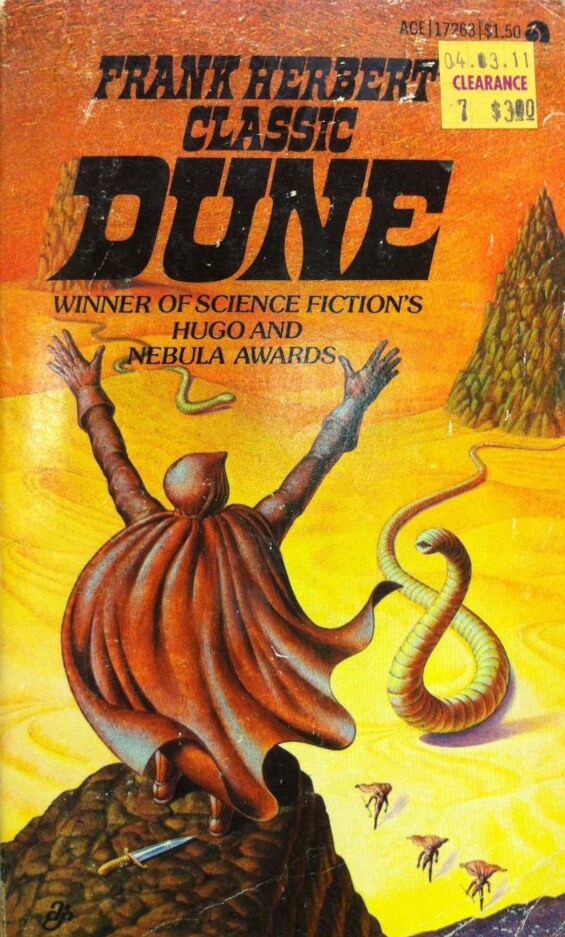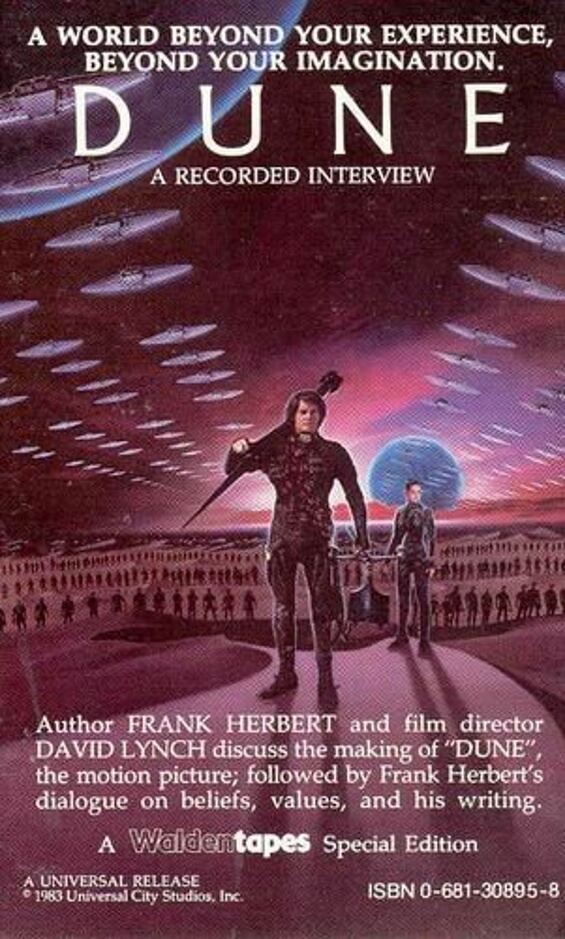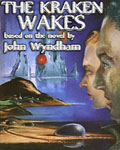
 The SFFaudio Podcast #488 – Jesse, Paul, Marissa, Bryan Alexander, and Will talk about Dune: Book III “The Prophet” by Frank Herbert aka the third third of Dune.
The SFFaudio Podcast #488 – Jesse, Paul, Marissa, Bryan Alexander, and Will talk about Dune: Book III “The Prophet” by Frank Herbert aka the third third of Dune.
Talked about on today’s show:
1965, The Santaroga Barrier, El Santos!, Luke Burrage, the worst part of the book, good stuff in here, amazing, stupendous, and really good, not spectacular, the most spectacular, man to man, a knife fight, the sparkling knife fights of conversation, reading the books for the action, an idea person, heavy on the ideas, the setup, the culmination, splayed out, family atomics, Paul’s analysis, which baby to never see again, it isn’t a Dune problem it’s an every book problem, who wants answers?, Herbert’s answers, it can’t exist without the other two, the only movie we should ever talk about, the scenes, the dialogue is all there, what’s missing, there’s a gun that doesn’t go off, very strange, the gun of Count Fenring, denouement, a friend of an emperor, Fenring vs. Paul, “Count Fenring: A Profile”, within his capabilities, not about Paul, this is Count Fenring’s book, this guy’s the one guy that’s never been in my vision, a lot of promise, what kind of power is it going to be?, the power of invisibility, Kwisatz Haderach, Jesse’s twitter profile, who Jesse modeled himself after, I don’t want that mantle, about the accretion of power, why Dune Messiah is such a fantastic book, private language, they did seduce Feyd, the Imperium beyond the Harkonnens, Russian Czar’s abdication, even if Fenring could defeat and kill Paul it wouldn’t stop anything, tapping into the collective consciousness, a Brian Herbert and Kevin J. Handerson quadrology, no attempt has ever been completed, walking wounded, sterile, a could-have-been, a powerless eunuch, forty or fifty pages where Paul isn’t mentioned, worldbuilding, Leto II, Alia lives, seeing all ends, the surfer on the wave, a lot of smart folks anticipating, the flags, C.H.O.A.M. or U.N., does that mean the bombs don’t hurt?, cover, saves the emperor’s life, a beautiful cruel joke, to reign in Hell, soft and wonderful, straight from the Iliad, too comfortable, from their decadence, a callback to the Trojan War, rest and pay taxes, Ottoman Janissaries, going crazy without a purpose, all the what ifs, suppose Paul dies, kill the rest of the universe, a tyrannical genocide, let’s go conquer the galaxy, destroy the spice, galactic civilization collapses, interstellar society, the best possible outcome, a Boethian decision, Book II, parallel structure, ooh I’m smart, happy birthday, it makes you feel like a supergenius, plans within plans feints within feints, combat to the death, another parallel, Feyd tries to take the Baron’s position, Thufir’s blindside, the Baron is so lovably evil (and competent), make Arrakis great again?, gluttonous lust, the slaveboy with a posion stinger in his thigh, let Feyd think that I saw it myself, actually I’m the smart one, Nefud, you still need me, I’m going to show you still need me, I’m going to remember this, the next scene that we never see, killing his harem, to take his punishment, Alia sting, Stilgar’s challenge for Paul’s leadership, should I cut off my right arm, so well highlighted, a fear-power relationship vs. a love-power relationship, the Baron hates truthsayers, the Bush administration, it could be true that’s good enough, truth means nothing, for the sake of tradition, ride the maker, this idea of history or necessity, bought a Bene Gesserit, you pay for that Amazon Echo dot but Amazon should be paying you, you know my tastes, I’m totally gay, the straight up interpretation, I don’t want them spying on me and manipulating me, on the Kinsey scale, other ways of getting semen, one would be valuable for…, advice, I trust them not, changing the subject, when Thufir has a fight with the Baron, there are things that you don’t need to know, Salusa Secundus, that tiny little fact (that the Baron wanted to turn the Arrakis into a prison planet), you fucked up, Rabban has to be cut off, the whole of the missing years, at least three years, the toddler, to save himself from the emperor, how the sardaukar are created, a spare heir, acting instinctually smartly, a political calculation that saves the Emperor’s life, to tame Thufir Hawat, making all the right chess moves, the Baron’s fate is not as forseeable, Baron Harkonnen did nothing wrong!, shall I dispatch her now Emperor, a victory for her brother, the revenge, kills her own grandfather, justice, this poor Baron, still ends up dead, a brilliance to this, easy to dismiss, everybody here is a monster, you should be afraid of Paul, Gurney gets an Earldom, and every surviving Atredies gets a title, Baronets all over the place, massive reward, this victory, the prophet Mohamed, all the Muslim lands, satrapys, Alexander the Great, Leopold II, plundering Africa, squeezing and squeezing, always a touch of the calculated, not from the heart, wanting everyone loyal, I NEED him, he’s a tool, forget the equipment, we need men now, like in the first book, shortly thereafter, not what the old Atredies would have done, regretting the loss of the equipment, the men vs. the equipment, nicely balanced parallel, the appeal of Paul, one of many many games, a fantastic power fantasy, Slan, the X-Men, Kyle MacLachlan, master of the universe, age 14, Achilles was 17 in the Iliad, cheeks too full for the desert, seductive, quietly undermining, if Aragorn was the main character in The Lord Of The Rings, Voltaire, tend your own garden, Irulan, how cruel Paul is to Irulan, I’m gonna treat her so bad baby!, Irulan plotting to kill Paul, the ultimate internal question, religion and politics in the same cart, the ultimate power fantasy for Paul, this quote is fantastic, treating Herbert as non-fiction, the Amish, that orthodox effort, that moment of peace for Paul and Chani, quiet hypocrisy, “terrible purpose” is repeated 23 times, another change, feeling it, a nice lady who has a little test for a little boy, the heat and pain pile, an iconic scene for all of science fiction, I see the truth of it, explosion of realization in the mental sphere, a drug book, Gaius Helen Mohiam appears like a witch, kind of kind, wench poured my water, her apprentice, you disobeyed your orders, until she shows up here at the end, how is she depicted, this child is an abomination!, is it TP? telepathy?, just like when I was getting consciousness uploaded when I was a girl, is she wrong?, mom shouldn’t do drugs when she is pregnant, making the sacrifice, child genius, leading a regiment at age 3, she’s meant to be the bad guy, we’re supposed to recoil, the coming jihad, only a glimpse, the dark future, this desert power, addicted to oil, solar power, Dune solved, when they go too far, only spice powered, no solar, no wind, cutting-off avenues of caught, Jesse is not Elon Musk’s team, artificial intelligence, AI as a weapon, hippy dippy engineering sociologist anthropology guy, terraforming, this is about O.P.E.C., the Hudson’s Bay Company or the East India Company, his stock in CHOAM is forfeit, brutal indignity, title rich and money poor, the role of oil, Butlerian Jihad as a useful phrase, techlash, jihad is not a word that sells well today, biased data, accentuating inequalities, dreadful flavour, future history, Isaac Asimov’s future history, tinkering back towards that, cast away AIs, the decline of Empire, science as priesthoods, that last Cold War, Giving Up The Gun by Noel Perrin, banning crossbows, giving up nuclear stockpiles, blew their noses off, high technology and its opposite, star spanning starcraft and medieval style politics, how Marissa’s games match her audiobooks, Horizon Zero Dawn, a robot safari, retreating from technology, ruins are computer screens, going back to the Amish, Mennonites, weird policy, no electricity, airpower, blenders running on compressed air, technological policies, what are the ramifications of this technology, landline telephones, cellphone technology, Africa’s wired cellular wallets, digital currency based on cellphone credits, what technology will be useful, Canada’s participation in NORAD, Cheyenne Mountain, WarGames (1983), nukes, we took the missiles but not the nuclear tips, Defense Minister and Prime Minster of Canada, advice on top secret stuff, managing treaties, political cost, being in NORAD, Iceland’s invasion during WWII, you can have your country back, a giant bully south of the border, obey the will of the giant country, John Diefenbaker, John F. Kennedy, what Syria is all about, the White Helmets, no giant surprise, an actual machine out there doing work, get on board or find a path through, the Bomarc Missile Crisis, the joint strike fighter debacle, if you look at the history of Canada in the right way, a positive force, Pierre Eliot Trudeau was paling around with Castro, a true image, Cuban doctors, plot machinations in the book mirroring a reality happening in the nows, mushrooms, more Marissa territory, hanging out with that worm, a coma for three weeks, some trip, time opening up, a sniff of a new drug, Feyd’s knife’s poison is transmuted, “poison” appears 117 times in Dune, chief poisoner, the Russian doping epidemic, bend over comrade, early on in book three, she took the coffee and sipped it, Frank Herbert’s at a rock concert, tripping out on the floor is transmuting, hot and delicious, room service, heaven for Jessica, she had thought of coffee and it had appeared, Tau, the subtle poison of the spice diet, enlightenment, their minds rejected what they could not encompass, more Slan, the guide, guided through the trip, Joe Rogan, taking the arrogance out of it, training, the etymology of psychedelic, psyche = soul/mind, delos = clarity/manifest, no mischaracterization, pattern recognition enhancement, seeming like a truth, the way the birds fly, “truth” is in the book 90 times, “pattern” comes up 48 times, the pre-spice mass, gathering up the magic mushrooms, a convenience, metaphorical, the power to destroy a thing is the power to control it, heavy shit, super-dark, science fiction genre history, partaking in jaspers, not the full-dune effect, amphetamines or coffee, town awareness, telepathy, drugs as a huge theme, stimulants, barefoot in the head, Robert Silverberg, Norman Spinrad, 1980, super-anti drugs, an exponent of coffee, Neuromancer, case is strung out all the time, reflecting what was happening in the culture, his case officer, Armitage implants a drug neutralizer, the ultimate solution for Reagan, The Hellgramite Method, how Keith Moon of The Who died, suicide, how science fiction shifts, innerspace going from biological to cyberspace, dated in interesting ways, the role of gender, Planet Of The Apes (1963), where Paul rides the sandworm, making the models feel realistic and big, the worm as a dragon, the Conqueror Worm by Edgar Allan Poe, much of madness more of sin, coffin worm of a dead world, a man making a steed out of a giant god, Reading, Short And Deep, Strange Exodus, gutted cosmic carcass, primal lust, humanity becomes a parasite, the image of man conquering death, it looks like a shot from Dune, a flea on a dog, the ecology, threatening a chain reaction, destroying all the oil like Saddam Huessein during the first Gulf War, not an atomic model, oil and drugs, Jessica’s power to transmute, a superhero story, Doc Savage stuff, if you’re anxious about your body, why Bryan doesn’t like the Lynch movie, minute operations, a weirding module defense in The Appendix show, that interior way, the women dare not look in that place, a place that women can’t go, the balance of the force, controlling the gender of their babies, controlling ovulation, super-yoga, a superpower, ultradiscipline, she didn’t seem to have an inner life, the women in here have huge inner lives, we spend a ton of time in Jessica’s mind, what’s going on in Paul’s mind, he becomes an enigma, the way Jordan Peterson talks about male and female minds, Jessica is a mom then she’s a reverend mom, Paul you do what’s good for you, is her mind expansion there a reflection, if men don’t have father figures, being raised by mothers alone, mothers want to protect their children, toughening, only giving into one instinct, having been tested, why the kwisatz haderach has to be male, the Y chromosome, how midwives are always women, midwives dudes, are male obstetricians uncool?, a caste based thing, training schools, Gurney even went to some school, the Suk school, training academies, he’s a mentat, who is the emperor’s mentat?, male domains and female domains, women’s roles and men’s roles, anthropological science fiction, traditional societies, strict gender roles, a remix of a medieval society, historical framework, Paul as the white savior, a male who solves a female problem, sexism, too easy, how powerful the role of Jessica is, Chani and Jessica and Alia, the brilliant one, the wise one, here too, there has to be a pattern, a version of Dune with Paula Atredies, Leta who bears a daughter, Grass by Sheri S. Tepper, if one was doing a university course on science fiction, one semester for each of Dune’s three books, an amazingly rich text, he’s the baddie, the subversion, from the fourteen year-old’s point of view, a wonderful adventure that makes you feel smart, over and over, a war book, a drug book, history, the Folio Society edition, Scott Lynch, Dracula, Bram Stoker, non of his other books are Dune level, The Dosadi Experiment, Whipping Star, Herbert is playing games of complexity and depth, Gene Wolfe, mind stretching, Samuel Delaney, a mental workout, an emotional workout, The White Plague, The Children Of Men, emotional destruction, taking story into all kinds of places, 159

Posted by Jesse Willis









